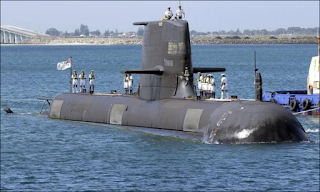Apr 26, 2016- France has beaten Japan and Germany to win a A$50 billion ($40 billion) deal to build a fleet of 12 new submarines for Australia, one of the world's most lucrative defense contracts, Australian Prime Minister Malcolm Turnbull announced on Tuesday.
The victory for state-owned naval contractor DCNS Group underscored France's strengths in developing a compelling military-industrial bid and is a blow for Japanese Prime Minister Shinzo Abe's push to develop defense export capabilities as part of a more muscular security agenda.

"The recommendation of our competitive evaluation process ... was unequivocal that the French offer represented the capabilities best able to meet Australia's unique needs," Turnbull told reporters in the South Australian state capital of Adelaide where the submarines will be built.
Australia is ramping up defense spending, seeking to protect its strategic and trade interests in the Asia-Pacific as the United States and its allies grapple with China's rising power.
Japan's government with its Mitsubishi Heavy Industries and Kawasaki Heavy Industries boat had been seen as early frontrunners for the contract, but their inexperience in global defense deals and an initial reluctance to say they would build in Australia saw them slip behind DCNS and Germany's ThyssenKrupp AG.
POLITICAL IMPLICATIONS
Industry watchers had anticipated a decision to come later in the year, but Turnbull's gamble on a July 2 general election has sped up the process.
The contract will have an impact on thousands of jobs in the shipbuilding industry in South Australia, where retaining votes in key electorates will be critical for the government's chances of re-election.
"The submarine project .. will see Australian workers building Australian submarines with Australian steel," said Turnbull.
DCNS, which traces its roots to 1624 and is 35 percent owned by defense electronics giant Thales SA, proposed a diesel-electric version of its 5,000-tonne Barracuda nuclear-powered submarine. DCNS enlisted heads of industry and top government figures to convince Australia of the merits of its offering and the benefits to the broader relationship.
Japan had offered to build Australia a variant of its 4,000 tonne Soryu submarine, a deal that would have cemented closer strategic and defense ties with two of Washington's key allies in the region but risked antagonizing China, Australia's top trading partner.
Under Australia's previous Prime Minister Tony Abbott, who wanted to pick the sub builder without a competition, Japan was seen as almost certain to secure the submarine contract, helped by a close personal relationship with Abe and with the tacit backing of the United States.
When Abbott was ousted by Turnbull in a party coup, however, criticisms of the Japanese bid, its inexperience and dearth of industrial ties grew.
Paul Burton, Defense Industry and Budgets Director at IHS Jane’s said it was a surprise from a strategic standpoint that Japan didn’t win.
Thursday, 28 April 2016
France sinks Japanese, German bids to win $40 billion Australian subs deal
About kumar
Author Description here.. Nulla sagittis convallis. Curabitur consequat. Quisque metus enim, venenatis fermentum, mollis in, porta et, nibh. Duis vulputate elit in elit. Mauris dictum libero id justo.
Subscribe to:
Post Comments (Atom)

No comments:
Write comments